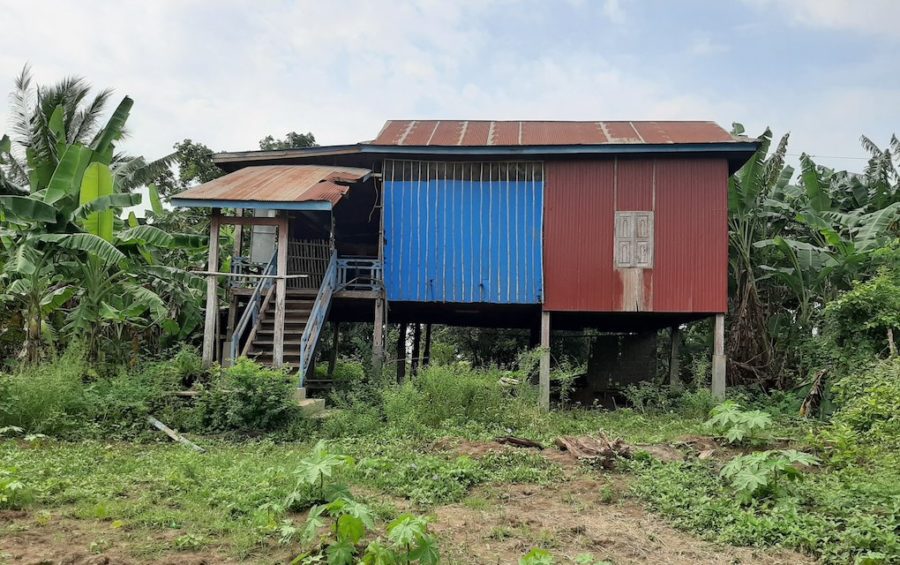More than half of surveyed families in a Banteay Meanchey village said the need to repay microfinance loans compelled some in their households to migrate to Thailand for work, which researchers say is part of a longtime, well-documented trend of debt-driven migration.
Human rights organization Licadho on Tuesday released a study of one village in Banteay Meanchey province, finding that most of the 30 households interviewed reported family members facing various problems due to their migration, including harassment from authorities, family separation, and feelings of fear and intimidation related to their debt, which is often collateralized by land titles.
The briefing paper, titled “Driven Out: One Village’s Experience With MFIs and Cross-Border Migration,” is based on interviews with residents of about half the homes in the surveyed village conducted in September 2019. All 30 of the interviewed families sent at least one worker, and sometimes up to seven, abroad to help pay off microfinance loans, the paper says.
“In some cases microfinance institutions (MFIs) directly encouraged migration by withholding loans unless a family could prove they had at least one member working abroad. In other cases, MFI loans were taken out in order to fund the costs associated with both formal and informal migration,” according to the paper.
One family told Licadho researchers that a credit officer threatened to force a borrower to sell their land, while another borrower was told by an officer from another lender to lie on their loan application in order to borrow money that would be used to back another MFI.
“If I paid back all my debts, if I had enough money, I wouldn’t go to Thailand,” a woman whose face it blurred says in a video released by Licadho last week.
The rights group also found that at least five workers who migrated from the village were teenagers, ranging from 14 to 16 years old. Similar to Cambodian labor laws, people can start legally working in Thailand at 15 years old, but they need to inform a labor inspector within 15 days of hiring.
Kaing Tongngy, a spokesman for the Cambodia Microfinance Association (CMA), said in an email that the Licadho report reflects the experience of a community that has the highest rate of migration.
“Highlighting only the most critical issues in the most affected area and linking them to microfinance is an unfair judgment and paints a bad image of Cambodia MFIs which are supporting 2.2 million people with sustainable financial services in a timely fashion,” he said.
Credit officers are never told to suggest labor migration as a means to pay for their loans, and while there are no bans on loaning to migrant workers, credit officers are supposed to “reject any loan request that could potentially affect the well-being of their client,” Tongngy said.
The association would look into ways it can collect data on the number of borrowers who migrate for work, he added.
According to Licadho, more than 2.6 million Cambodian borrowers held more than $10 billion in microfinance debt by the end of last year, with an average loan size of $3,804 — the highest amount in the world, and an increase from $3,370 at the end of 2018.
As Thailand clamped down on its border with Cambodia amid the global Covid-19 pandemic, more than 80,000 migrant workers have returned to the country in recent months, Licadho said, citing Interior Ministry figures.
Maryann Bylander, an assistant professor at Lewis and Clark College in the U.S. who has researched microfinance for more than a decade, said that microfinance has been a motivation to migrate for as long as she has researched the subject, and that lending institutions should be well aware of the connection.
Though she had not heard of credit officers directly making migration a condition of granting a loan, she said the commercialization of the industry has pushed the sector to give out loans far beyond what an average family can afford, while migrant workers are preferred loan candidates because of their relatively larger and more stable salaries.
“These are not the experiences of a single community, they are widespread and have been well-documented by a range of different researchers and research methods,” she said in an email.
Last year, a report from the International Organization for Migration (IOM) authored by Bylander noted that average MFI loans in Cambodia were far greater than average income, and about 50 percent of workers reported being moderately or highly over-indebted, according to an unpublished 2017 report from microfinance investors.
Licadho’s director Naly Pilorge said the families of workers who returned from Thailand because of Covid-19 this year are now more at risk of sinking into over-indebtedness from the sudden lack of income.
“Far too many families have had to leave their homes and their country to repay microfinance institutions,” Pilorge said in a statement. “Now, with tens of thousands of former migrant workers unable to work in Thailand due to Covid-19, the government and MFIs must help these borrowers by suspending repayments and returning land titles.”
Last week, Licadho and 134 other civil society groups also urged the government to suspend repayment of microfinance loans for at least three months and return land titles held as collateral.
Bylander, the researcher, warned that Covid-19 presented an “alarming nexus of vulnerability” to migrant workers in debt, and while an industry group like CMA might set out best practices, they will ultimately help their member institutions over borrowers struggling with increased economic hardships.
“Land dispossession can happen regardless of the guidelines set out by CMA or policymakers,” she said. “If there isn’t a group working to educate people on their rights as borrowers, the legal obligations of MFIs, and what they can do to report predatory behavior, the policies are limited in their effectiveness.”













